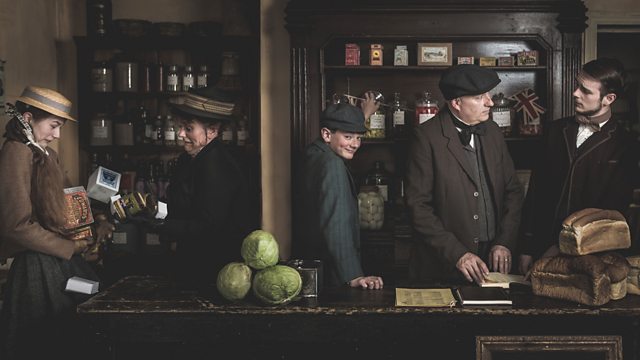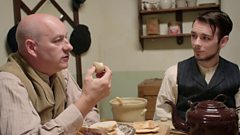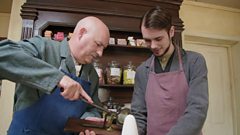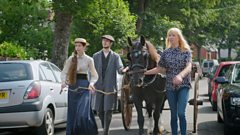
Victorian
The Arderns start their time-travelling adventure running a Victorian corner shop, discovering how life behind the counter reflects two decades of incredible social change.
The Ardern family from Sheffield are embarking on an extraordinary time-travelling adventure, going back in time to run that great British institution, the corner shop. They experience 100 years of shopkeeping, discovering how what they sell, how they sell it and who they sell it to reflects the changing lives of ordinary families in Britain.
The show has taken over a former corner shop in Meersbrook, a working-class suburb of Sheffield. Purpose-built as part of the city’s urban expansion in the late 19th century, the programme follows the story of shops like these through a century of trade. Guided by presenter Sara Cox and social historian Polly Russell, the family of five work in and live above the shop, starting in the Victorian era, when locals relied on their corner shop for all their daily provisions, and finishing in the late 1990s, when convenience and last-minute items were the name of the game.
The family’s experience begins in 1897 when the shop - and the suburb around it - was built. In Sheffield, the thriving steel industry had created a booming population as families flocked to the city for work. With so many new customers to serve, being a shopkeeper could be highly profitable. Long before the days of the family car and the out-of-town supermarket, corner shops were a vital part of these new residential areas. Stocking everyday necessities at affordable prices, locals would do almost all their shopping there, often visiting several times a day.
As a Victorian shopkeeping family, all five of the Arderns are involved in the day-to-day running of the shop, keeping their customers happy and the shelves full. With very few pre-packaged goods and no self-service, the men of the family must get to grips with a much more hands-on approach - measuring and weighing out items for their customers, who have to sit and wait - and wait - to be served. Old-fashioned gender roles mean the women are kept busy in the basic Victorian kitchen, tasked with keeping the shelves fully stocked with homemade counter goods like jam, tartlets, pasties and hair-raising health tonics, all based on recipes of the time. On top of that, they also need to provide meals for the family, from convenient tinned mutton sandwiches to the challenging combo of Shredded Wheat doused in a Marmite broth.
The family find out how changes in the world around them over the course of the next few years affect the stock on the shelves. At first a supplier of mainly local fresh food and loose goods, innovations like tin cans soon encourage imports of new goods from across Britain’s empire, an increasing interest in health and well-being brings a range of potent but unregulated medicines, and, as the mass production of food begins to increase, some familiar pre-packaged brands begin to appear.
The shop’s customers are recruited from the local area and the Ardern family have to make sure they keep coming back. From providing a first-class service while trying to wrap up jam in greaseproof paper to laying on a local coronation celebration fit for the new king, they discover how the Victorian corner shop quickly became the heart of its community.
It is hard work, but there is still time for some fun. Aramis the horse joins the family to help with deliveries, and to celebrate the 1908 Olympics, Dame Kelly Holmes puts the family through their paces in an Edwardian-style work out.
Boom times are brought to a halt by World War I. With Britain depending so heavily on imported food, enemy attacks soon have a profound effect on the country’s supplies. No rationing was put in place and, by 1917, Britain was in danger of being starved into surrender. Corner-shop shelves were bare, and what was available became much more expensive. It is not just the customers who are in for a shock – the Arderns' own larder suffers, so mum must come up with alternative ways to feed her family with what little is available.
As the decade draws to close, the Great War finally comes to an end. The shelves are full again and the Arderns throw a peace party to celebrate and say thanks to the community.
Last on
More episodes
Previous
You are at the first episode
Clips
-
![]()
Pickled eggs divide opinion at the dinner table
Duration: 00:30
-
![]()
Exercise - Victorian style
Duration: 00:49
-
![]()
Dave and the sugar nippers
Duration: 01:10
-
![]()
Sarah brings the family a horse and cart
Duration: 01:52
Music Played
-
![]()
Joseph Haydn
Finale: Trumpet Concerto
-
![]()
Wolfgang Amadeus Mozart
Horn Concerto No.4 In E Flat K.495: Rondo
-
![]()
Franz Schubert
Andante Con Moto From Piano Trio No. 2 In E Flat Major D. 929
-
![]()
Ivor Novello
Keep the home fires burning
Performer: Olive Gilbert. -
![]()
Johann Sebastian Bach
Cello Suite No 1 in G major, BWV 1007 (Prelude)
Performer: Natalie Clein. -
![]()
Scott Joplin
Weeping Willow
-
![]()
J Strauss II
Perpetuum Mobile
Credits
| Role | Contributor |
|---|---|
| Presenter | Sara Cox |
| Director | Francis Welch |
| Presenter | Polly Russell |
| Series Producer | Victoria Bell |
| Executive Producer | Emily Shields |
| Producer | Sophie Wogden |
| Editor | Natasha Hayes |
| Line Producer | Abigail Watts |
| Production Manager | Laura Tjia |
| Production Company | Wall to Wall West |
Broadcasts
- Tue 25 Feb 2020 20:00
- Sun 1 Mar 2020 18:00
- Fri 13 Mar 2020 08:00
- Tue 19 Jan 2021 19:00
- Mon 31 Jan 2022 15:15
- Mon 29 May 2023 16:15
- Thu 3 Oct 2024 15:15
Featured in...
![]()
How We Built Britain
A rich history of human-built environments and architectural marvels.






